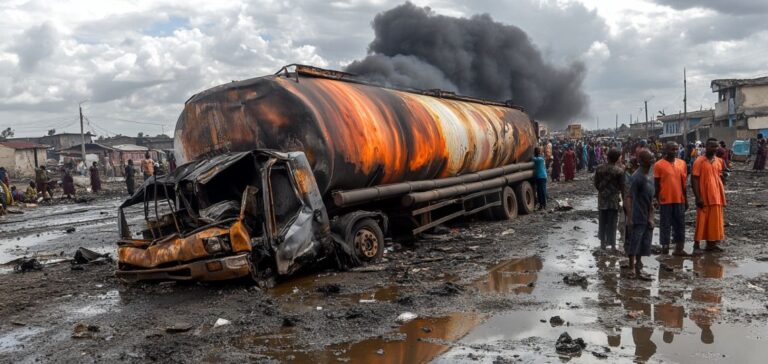A tragic accident involving a tanker truck occurred on Saturday in Enugu, southeastern Nigeria, killing 18 people. The Federal Road Safety Corps (FRSC) reported that the brakes of the fuel-laden truck failed, causing it to collide with 17 vehicles. The accident ignited a fire that destroyed 11 vehicles, leaving some victims unrecognizable. Among the 31 people involved, 10 were rescued with severe injuries.
This tragedy comes just a week after another similar accident in Niger State, where a tanker truck exploded as a crowd attempted to retrieve spilled fuel. That incident claimed at least 98 lives, according to authorities. These accidents highlight the recurring dangers of fuel transportation in Nigeria.
Frequent and Fatal Accidents
Nigeria, Africa’s most populous country and its largest oil producer, often witnesses similar tragedies. Over the past five months, more than 265 people have died in tanker truck accidents. In October, a similar incident in Jigawa State claimed over 170 lives.
In response to this crisis, the governor of Enugu State, Peter Mbah, has urged authorities to enforce stricter safety measures for trucks carrying flammable materials, such as equipping them with anti-spill devices. However, the implementation of these measures faces logistical challenges and the limitations of Nigeria’s road infrastructure.
The Dangers of a Precious Fuel
The soaring fuel prices in Nigeria exacerbate risky behavior. Since the removal of fuel subsidies in 2023, prices have quintupled, making fuel highly valuable for many Nigerians. This economic context drives some to take significant risks, such as collecting fuel from accident sites.
Nigerian authorities are attempting to address this trend. President Bola Ahmed Tinubu recently launched a national campaign to raise awareness of the risks associated with handling fuel during road incidents.
Unanswered Questions
Despite the announced initiatives, these accidents raise crucial questions about the regulation of hazardous material transport and the state of Nigeria’s road infrastructure. While preventive measures are frequently discussed, their enforcement remains limited, increasing the likelihood of similar tragedies in the future.






















